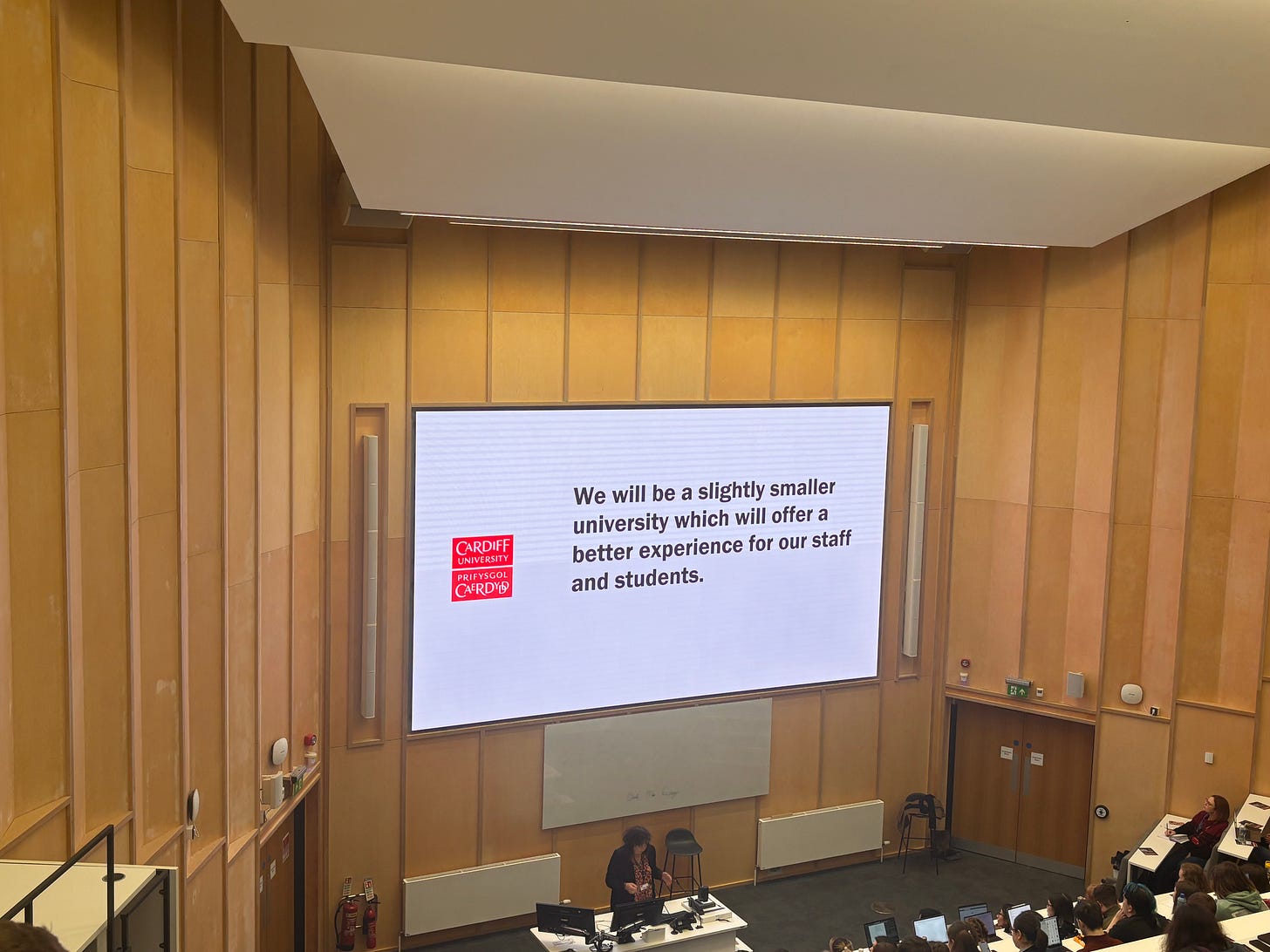In Defence of Destroying an Educational Institution
What Professor Wendy Larner told Cardiff University students about the proposed changes to Cardiff University's academic offerings
On Wednesday, 12th February, a group of Cardiff University students crowded into one of the uni’s newest — and largest — lecture theatres for a ‘Town Hall Meeting’ with Vice Chancellor Wendy Larner. Supposedly, the meeting was set up by the Student’s Union to reassure students about the destructive cost-cutting proposals from the university’s leadership. However, when Prof. Larner took to the front of the lecture theatre to try and defend her team’s choices to dismantle arts, humanities and nursing courses at Cardiff University, she did very little to appear in control of the situation.
If you’re not already aware, Cardiff University is one of many universities in the UK suffering from a funding crisis. To fix the crisis at Cardiff, a decision has been made to close courses in Ancient History, Religion and Theology, Modern Foreign Languages, Music, and Nursing. As you can imagine, this has massively backfired on Prof. Larner and her team — and rightly so.
If you’d appreciate some brief highlights from Prof. Larner’s talk to Cardiff students last week, here’s what my partner and I managed to come up with as a summary:
Professor Larner is incapable of taking accountability for her ideas. During the hour-and-twenty-minute session, Prof. Larner blamed A-Level students, the media and even the Welsh Sennydd debates for the drastic nature of her plans, instead of admitting a painful lack of clarity from her team.
Prof. Larner doesn’t think there’s anything wrong with taking home almost £300k per year for her role as Vice Chancellor, whilst she is proposing axing 400 jobs at the university to cut costs.
Despite a vote of no-confidence in the university leadership and potential mismanagement of university funds, Prof. Larner declined to comment on the competency of her and her staff when asked by students at the meeting.
So, if she didn’t answer some of our most important questions, what did she actually say?
Well, the answer is confusing. Prof. Larner didn’t want to commit to any firm answers but gave a speech full of contradictions to students. For example, she fiercely stated that her team had a ‘shared commitment to the co-creation, the sharing of knowledge … for future generations’ and that they were committed to ‘offering an excellent educational experience for students of all backgrounds and experiences and committing to flexible, lifelong learning that creates a positive change’. However, it’s unclear how Prof. Larner expects to offer a well-rounded education to students at Cardiff when she proposes such a drastic reduction of courses at Wales’s foremost university.
One of the slides she showed asked in bold letters: ‘What Kind Of University For What Kind Of Future?’ And indeed, what kind of university will be left when Prof. Larner is done with her plans?
According to her, they will be a smaller university offering a ‘better experience for staff and students’. But, imagine with me for a moment, a world without music. A hospital without nurses. The ignorance that will come from restricting education in languages, history, and faiths. Is her high salary and ultimate goal of a 12% operating surplus worth the cultural destruction that may come from her teams’s plans?
Well, I’m not the only one who had questions. So, here’s three key concerns Cardiff students raised with Prof. Larner on Wednesday — and all the ways she dodged giving us an actual response.
I’ll start strong here with a question from a Law and Politics student in the audience who asked:
‘I just want to say that the UCU voted recently, they don't have confidence in you… [and] Many people will be aware that you earn quite a significant salary for your job… If you've looked at every cost-cutting measure, have you considered taking a pay cut yourself?’
Prof. Larner’s response was as follows:
Firstly, she berated the student slightly by saying it ‘was more than one question, to be honest’ and avoided directly answering questions on incompetency. She said he used ‘the trope of VC salaries’ and dodged the topic of her £290k per-year pay packet by saying, ‘cutting my salary isn’t going to find us £30 million, you know, to be blunt about it.’
Then, a modern languages student weighted in with some important statistics about what the cuts will mean for the University, and Wales as a whole:
‘The proposed cuts would make Wales the only country in the developed world where you cannot study a foreign language in the nation’s capital. [and] Cardiff University provides 60% of all modern language provision in Wales and is a key partner in the Welsh Government's international Language Strategy. These cuts will also reduce the supply of foreign language teachers and continue to damage the economy … [as research shows that] a lack of international languages is costing the UK billions of pounds each year. These cuts scream out — whether you and the board intended it to or not — that the board is happy for the people of Wales to be a nation without global reach.’
Prof. Larner’s response was, once again, more than a little patronising when she said:
‘The capital city’s importance for modern languages — I get it, I absolutely get it … [but] Y’know, the idea that Wales cannot be global without modern languages, I'm less clear about. I think, uh, Wales is global in lots of different ways throughout all parts of this university.’ She then referred back to previous comments about the team’s desire to ‘really put ourselves on the global map’, but also acknowledged that ‘at the moment we're on the global map for exactly the wrong reasons’.
Now, this next question is important for anyone worried about the state of nursing in Wales and the impact Prof. Larner’s choices will have on the NHS, as a mental health nursing student asked:
‘You say that other universities in South Wales currently offer nursing degrees, but NHS Wales alone is currently operating at a shortage of 2000 nurses, which is, … a massive risk to not only patient safety but staff safety. You say you have a duty of care with other universities, such as us, who have been struggling financially. How do you expect them to pick up the slack if they are expected to hire more staff and teach more students, while also keeping the quality of nursing education and the safety of student nurses while on placement?’
Prof. Larner’s response was muddled, so I’ll explain what she seemed to mean after the quotes:
‘Some of you might have seen me being very ranty about competition law… The regulatory frameworks for universities at the moment are set up to encourage us to compete instead of encouraging us to collaborate. Now, in Wales as I arrived, the Minister of Education was saying we need a more differentiated yet collaborative system and I thought that was a really good idea. So I really like the idea of a collaborative, differentiated system because actually taking out some of the competition will allow us all to play to our strengths, to do more … We want to have a conversation [about] how we can do nursing better in South East Wales, [and] what might that look like?’
So, what Prof. Larner is suggesting is that the closure of the Nursing courses at Cardiff University will actually benefit the NHS and nursing training providers in South Wales. Despite not fully explaining the nature of this competition law to students, she suggested that closing nursing at Cardiff would allow for collaborative discussions to take place with higher education institutions and the NHS on how best to provide nursing training. She did not, however, clarify how she expected the other universities to pick up the slack in the wake of Cardiff’s changes. She also strongly criticised the media response to her shocking choice, saying:
‘You know, that was my frustration about the media coverage. You know. Oh, that she doesn't care about Wales. She doesn't care about nurses. Of course, I care about Wales. Of course, I care about nurses. But we were prevented from having the conversations we needed to have until the proposal had been released.’
Finally, when asked about the logic of the proposed opening of a Cardiff University campus in Kazakhstan, considering the university’s financial difficulties, Prof. Larner once again balanced clarification and blame in her response:
‘You know, the media fixated on Kazakhstan partly because of a few inaccurate comments in the Welsh Sennydd. But we have been in conversations in Singapore and Malaysia. And these are early conversations. Early, early work.’ However, she did say that the university did not expect to spend money on the Kazakhstan project, ‘other than a bit of money on due diligence.’ She says that, if the plan goes ahead, ‘They will put all the resources on the table … what we will do is teach.’
At various points throughout her talk, Prof. Larner was both incoherent and condescending. When looking back on the meeting transcripts and listening to the audio recording, there is a distinct sense that our concerns were not always taken seriously. She dodged our important questions, giving half answers or skipping sections of our questions entirely, and when asked about the university’s future in light of these plans, she offered the response: ‘being different means being different.’
Furthermore, even when not speaking, Prof. Larner came across as disinterested in what students said. During some students’ questions, when Prof. Larner disagreed with a student, she would puff out her cheeks and shake her head vigorously like an unimpressed Winnie the Pooh. The interruption through body language instead of words was no less disrespectful to the concerned students.
Furthermore, her persistent attempts to shift the blame for out concern onto the senior staff member who acted as whistleblower, the media’s reports, and the Sennydd debates indicates that she does not fully understand the impact of what she is proposing and the fear of uncertainty she is responsible for.
And so, it leads to the question: What will be left of Cardiff University when Professor Larner and her team have finished with it? And does the University leadership not understand that our outrage and confusion is the result of being shat on from a great height — not media reports or Sennydd debates, as Prof. Larner suggests.





